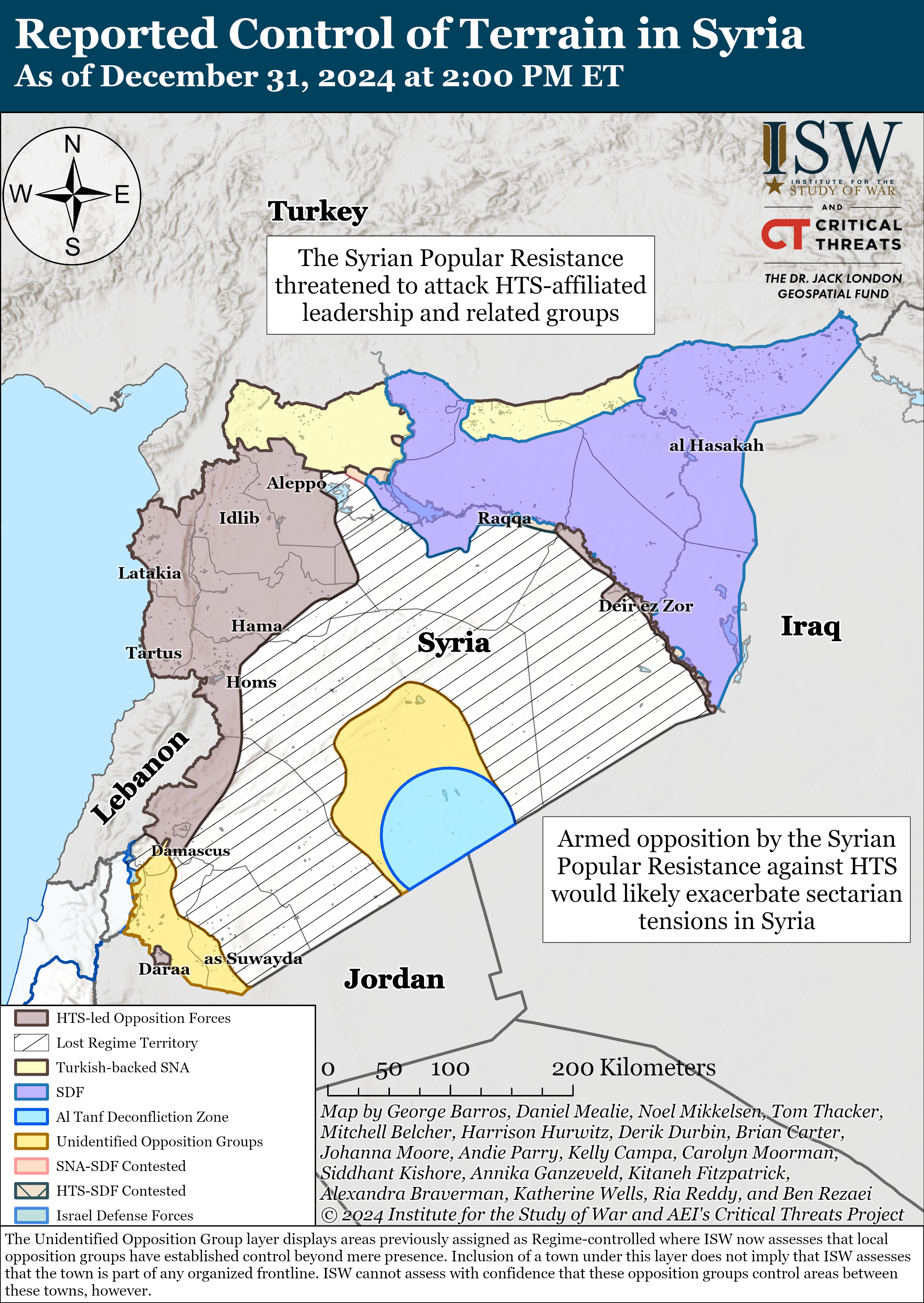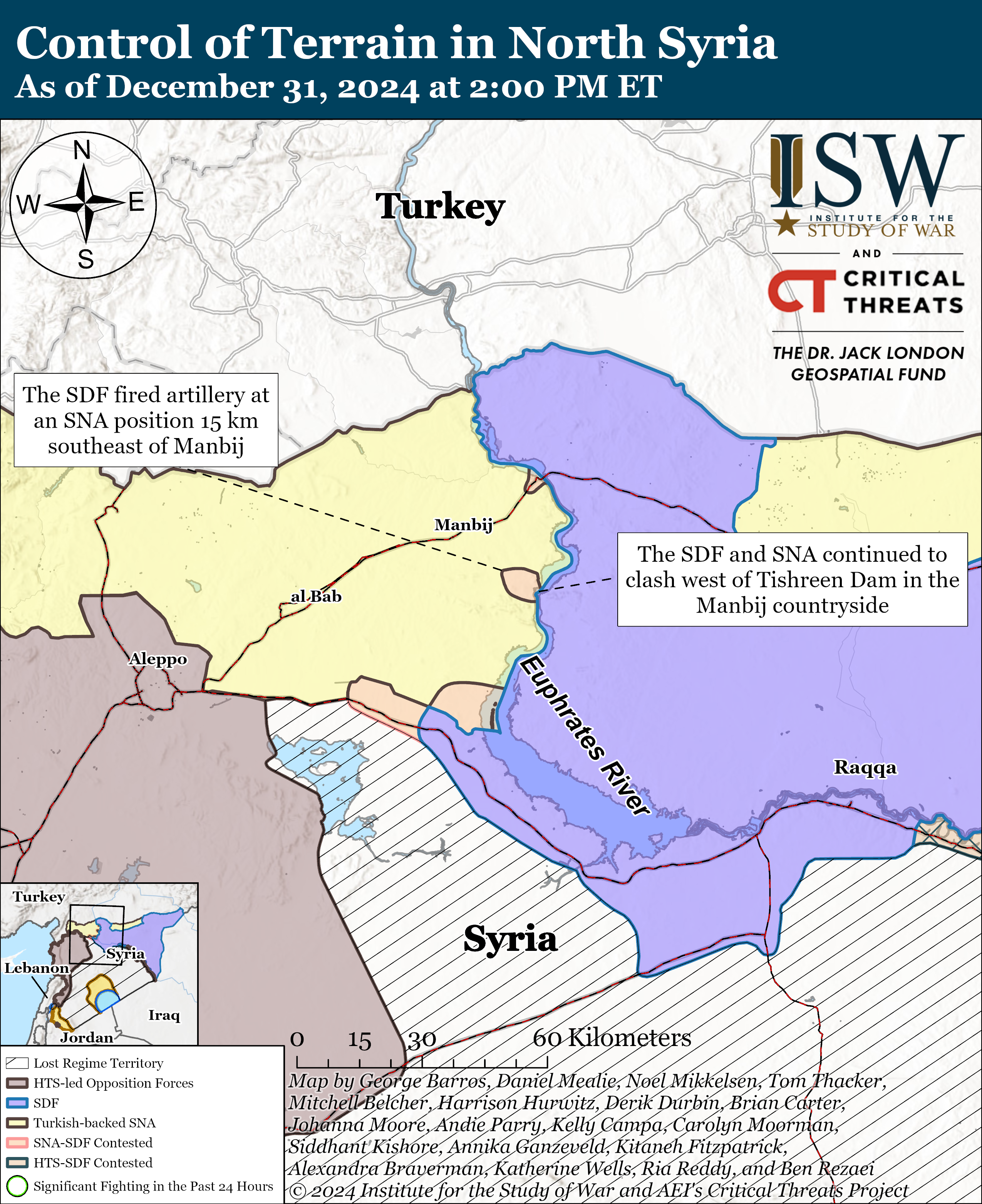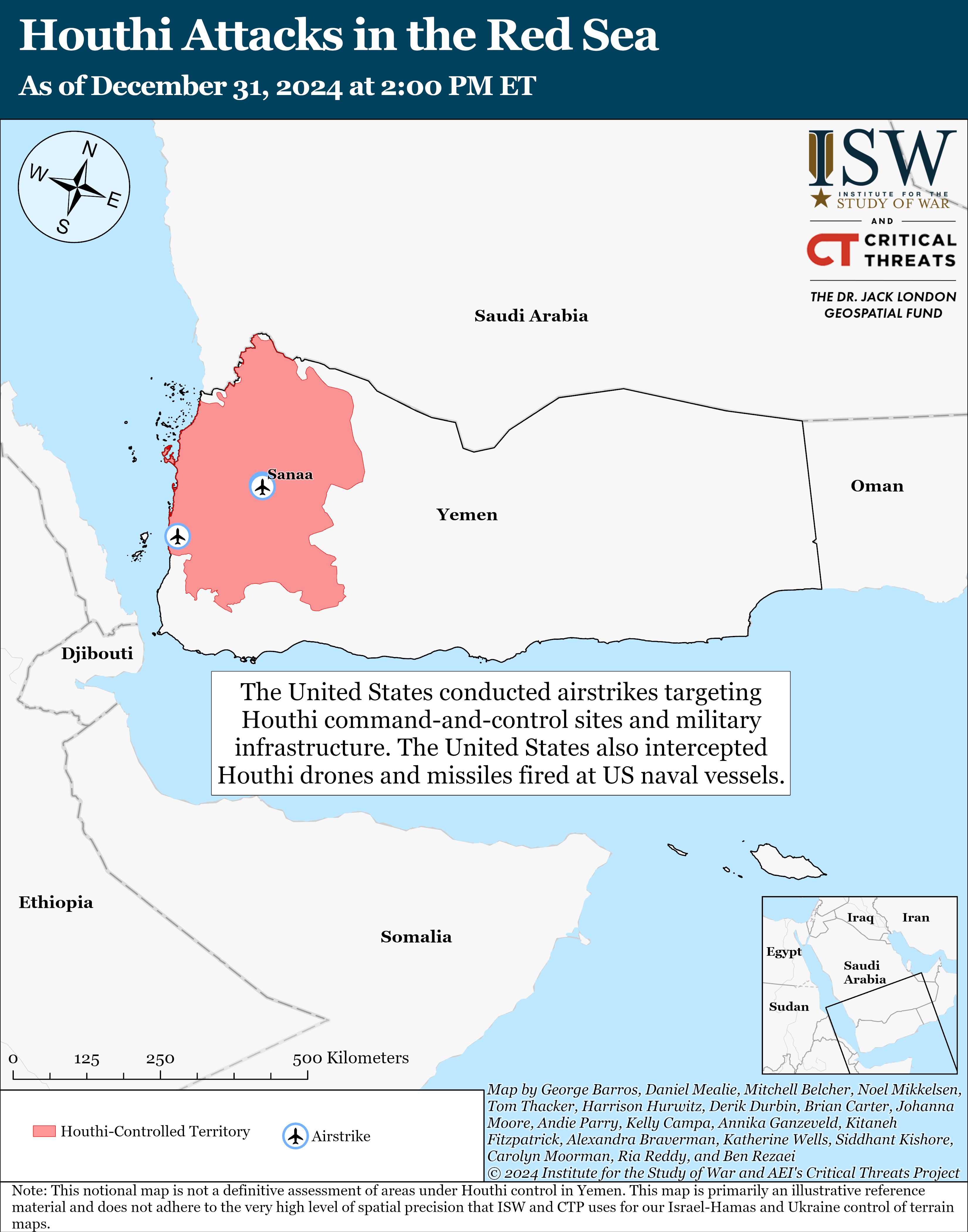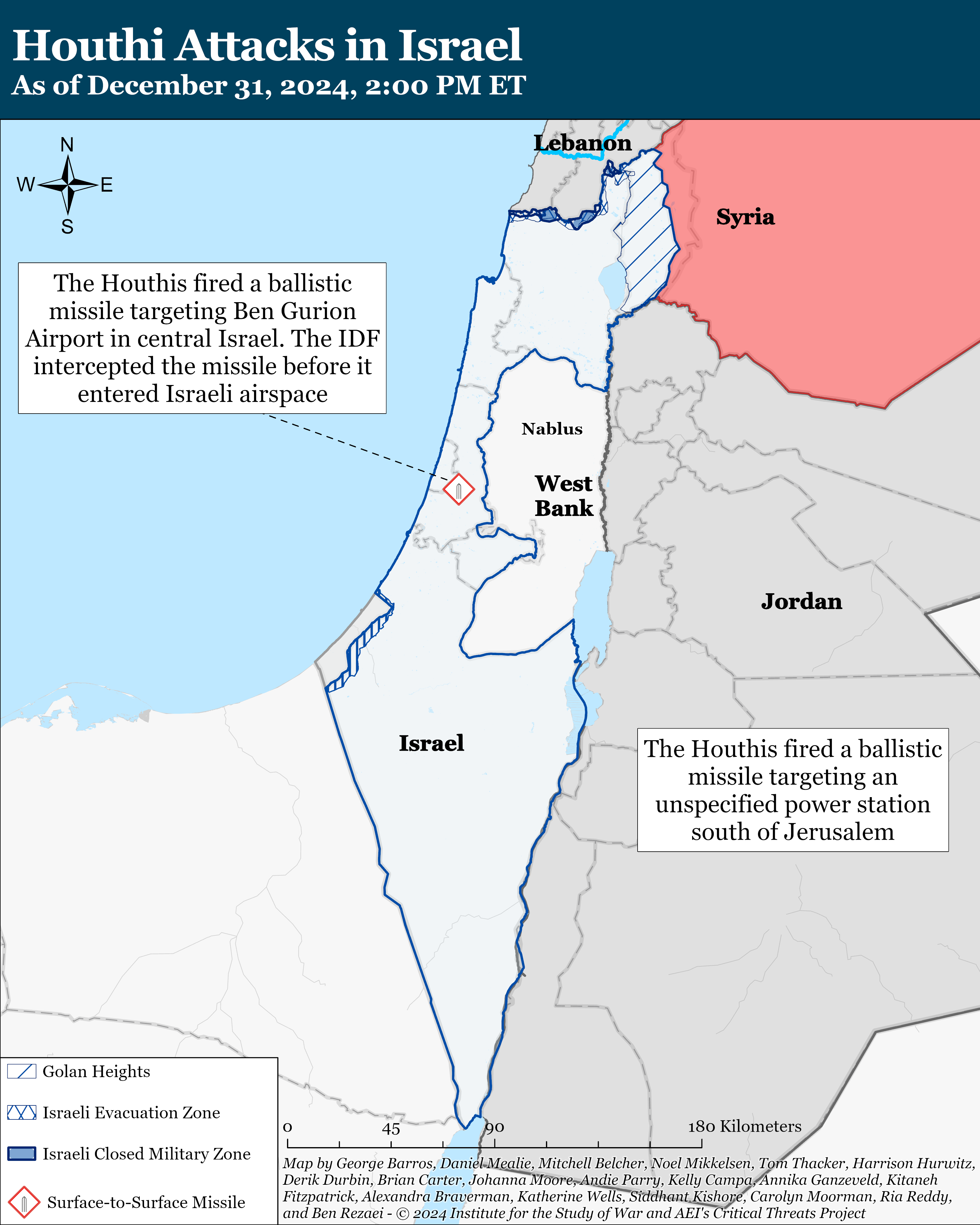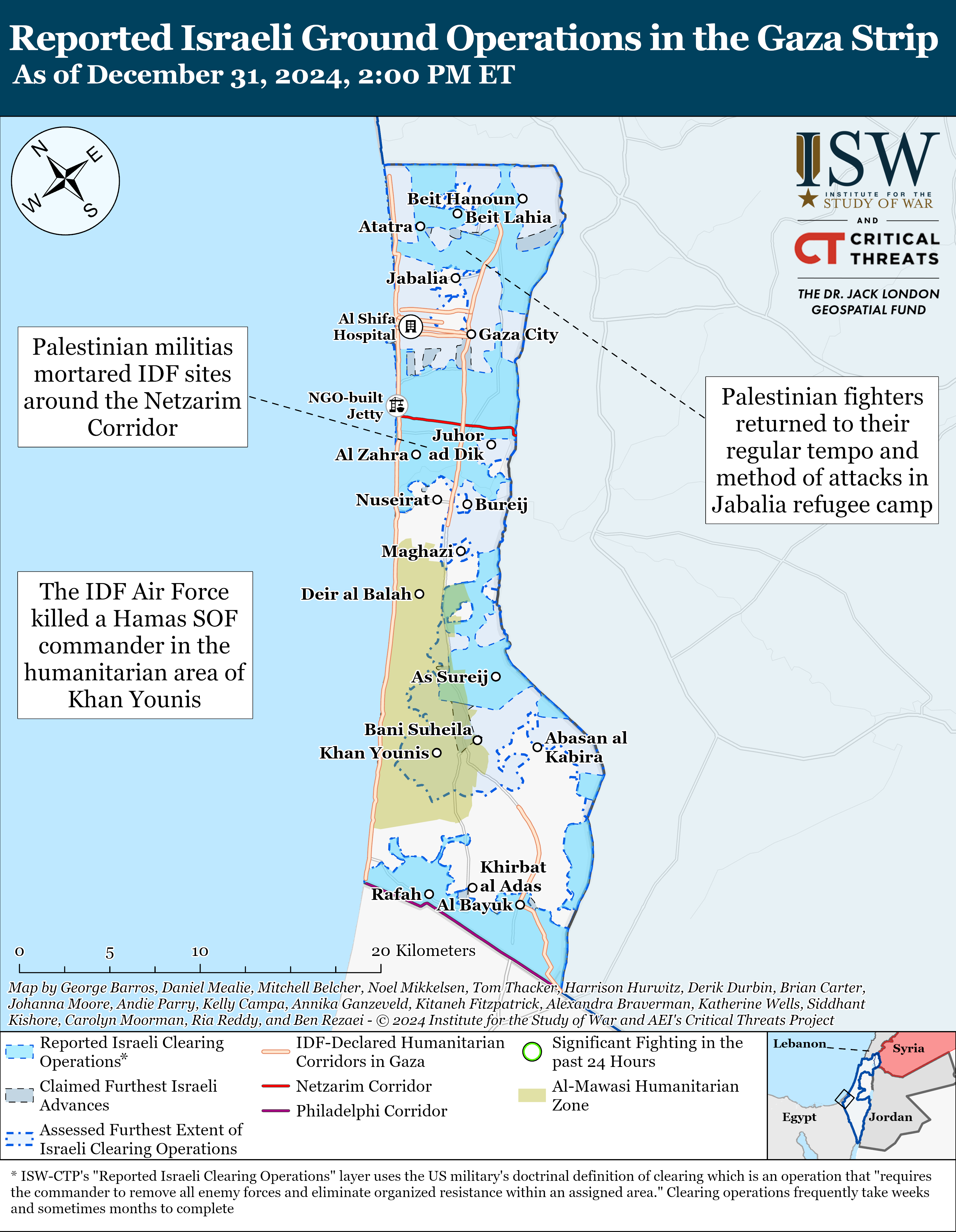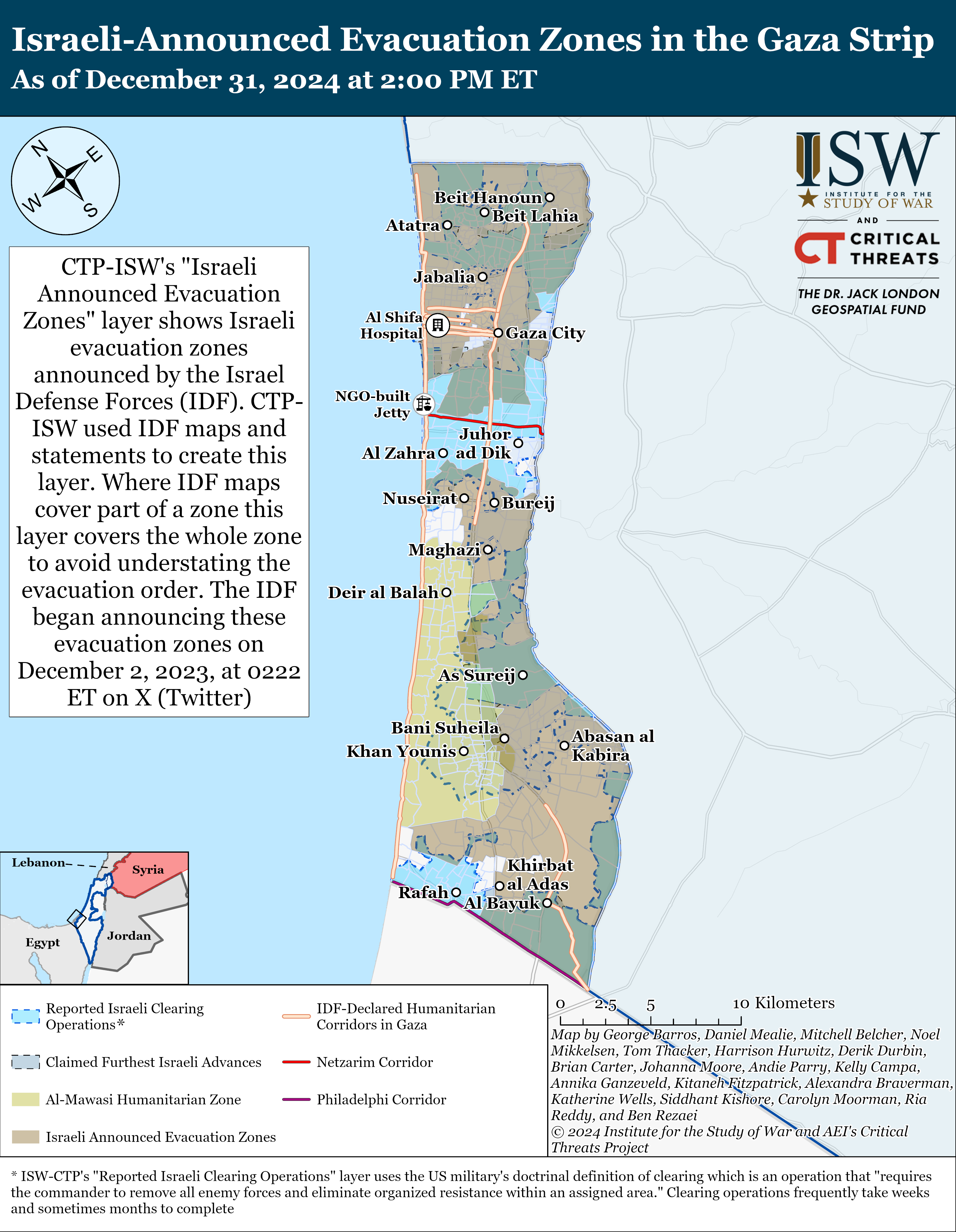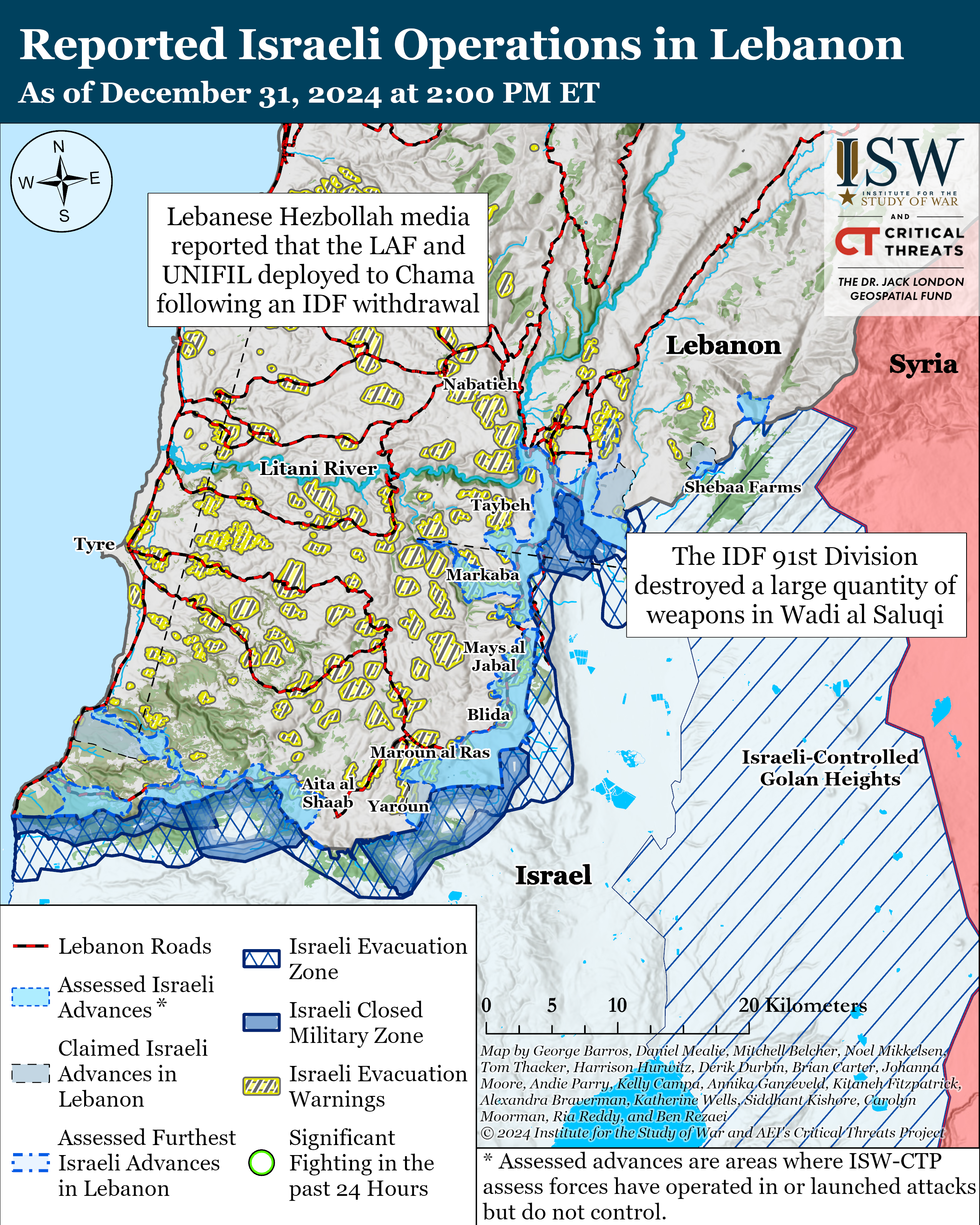 |
 |
Iran Update, December 31, 2024

Iran Update, December 31, 2024
Johanna Moore, Ria Reddy, Andie Parry, Katherine Wells, Carolyn Moorman, Ben Rezaei, and Nicholas Carl
Information Cutoff: 2:00 pm ET
The Critical Threats Project (CTP) at the American Enterprise Institute and the Institute for the Study of War (ISW) publish the Iran Update, which provides insights into Iranian and Iranian-sponsored activities that undermine regional stability and threaten US forces and interests.
Click here to see CTP and ISW’s interactive map of Israeli ground operations, and here to see CTP and ISW’s interactive map of the ongoing opposition offensive in Syria. These maps are updated daily alongside the static maps present in this report.
We do not report in detail on war crimes because these activities are well-covered in Western media and do not directly affect the military operations we are assessing and forecasting. We utterly condemn violations of the laws of armed conflict and the Geneva Conventions and crimes against humanity even though we do not describe them in these reports.
A new group announced its opposition to the Hayat Tahrir al Sham (HTS)-led interim government.[1] Armed opposition by the group—named the Syrian Popular Resistance—would likely exacerbate sectarian tensions in Syria and even risk driving fissures in the HTS-led coalition. The Syrian Popular Resistance in a statement on December 29 threatened to attack HTS and HTS-affiliated leaders purportedly in response to the killing of Christians, Shia, and Sunnis since overthrowing the Bashar al Assad regime.[2] The Syrian Popular Resistance labeled the HTS-led coalition as “Kharijites,” which derogatorily frames the coalition as heretical. The statement by the Syrian Popular Resistance comes as nascent opposition against HTS has appeared, especially along the Syrian coast, which is predominantly populated by the Alawite minority.[3] It is possible that the Syrian Popular Resistance is affiliated with this activity, though CTP-ISW cannot verify the exact nature and origin of the group. Growing conflict between HTS and minority and opposition groups would fuel sectarian tensions, drive an escalation cycle, and risk destabilizing Syria further. Although HTS leader Ahmed al Shara has repeatedly used tempered and inclusive rhetoric in recent weeks, he would struggle to contain such a cycle of violence given some of the extreme Salafi-jihadi and sectarian actors that constitute his coalition.
There are growing indications that Iran is trying to stoke and exploit sectarian violence in Syria. Doing so would weaken the HTS-led interim government and help reestablish the Axis of Resistance in Syria. The main outlet of the Iranian Islamic Revolutionary Guard Corps (IRGC) called on December 31 for a counter-revolution in Syria, framing it as a response to the "occupation" of Syria by "takfiri terrorists."[4] This term refers to apostates and is commonly used by Iran to refer to the so-called “Islamic State” and other armed Sunni organizations. The IRGC report added that the liberation of Syria is “imminent.” This rhetoric from the IRGC marks the first time that CTP-ISW has observed Iran appearing to call for a revolt against the HTS-led interim government. Rhetoric from Iranian leaders and state media has until this point ambiguously called for the formation of armed resistance in Syria but would often mention resistance to Israeli ground operations in southwestern Syria in the same breath. That the main outlet of the IRGC made these remarks is especially noteworthy given that regional sources have claimed that the IRGC is planning to organize, direct, and support new proxy and partner militia networks in Syria. It is also noteworthy that the IRGC report comes around the same time that the Syrian Popular Resistance announced its formation and opposition to the HTS-led interim government. Iranian state media has previously reported on the formation of armed resistance against HTS in positive terms.[5] Iranian Supreme National Security Council Secretary Ali Akbar Ahmadian separately stated on December 31 that "a new resistance has been born [in Syria] that will manifest itself in the coming years" during a meeting with the Omani foreign affairs minister.[6]
The US-backed Syrian Democratic Forces (SDF) and Turkish-backed Syrian National Army (SNA) have continued to clash in northern and northeastern Syria on December 31. The SDF mourned a fighter that died in clashes near Qara Qozak bridge on December 31, indicating that fighting has persisted there.[7] Anti-SDF media claimed that the SDF and SNA continued to clash west of Tishreen Dam in the Manbij countryside.[8] An SDF media official reported that SNA forces in Manbij City attacked the SDF with heavy artillery near a town that is 15 km southwest of Manbij City on December 30.[9] Anti-SDF media also claimed that the SNA fired artillery at SDF positions near Kobani on December 31.[10] US Defense Department deputy press secretary said on December 30 that the ceasefire between Turkey and SDF continued to hold around Kobani, where Turkish forces have reportedly massed along the Syria-Turkey border.[11]
The HTS-led Military Operations Department continued to clash with pro-Assad elements that refused to settle with the interim government and disarm. Syrian media reported small arms fire during a Military Operations Room raid in northern Damascus that is generally considered loyal to the former Assad regime on December 31.[12] Other sources disputed the account of clashes and said that the HTS-affiliated forces only entered the suburb to detain three gunmen when called by neighborhood officials.[13] HTS-affiliated forces operated against former regime elements in other Damascus neighborhoods without reports of small arms fire as well.[14] The Damascus clashes appear to have been isolated and minor, if they even occurred at all, especially compared to the interim government’s deployment to coastal Syria during which its used attack helicopters against pro-regime fighters.[15] The HTS-led Military Operations Department additionally imposed a curfew in Talbiseh, north of Homs City, during an operation to detain former regime fighters.[16]
An unspecified Israeli official speaking to Israeli media expressed interest in increasing cooperation with the US-led international coalition against the Houthis in Yemen.[17] The official emphasized the threat that the Houthis pose to international security and shipping and that the international coalition should ”confront and eliminate this threat.” The Israeli official also emphasized that the Houthis should not be underestimated due to their advanced technologies and intent to threaten Israel, international shipping, and other regional targets, including Saudi Arabia.
These Israeli comments come amid continued US airstrikes on Houthi targets in Yemen. US Central Command (CENTCOM) confirmed US airstrikes targeting Houthi command-and-control sites and military infrastructure on December 30 and 31.[18] Houthi media confirmed two US airstrikes hit around al Tuhayta, south of Hudaydah on December 30, 10 airstrikes hit the 22nd May military complex and two airstrikes hit al Arad military complex, both in Sanaa.[19] Houthi military spokesperson Yahya Sarea claimed that the Houthis tried to preempt the US airstrikes by firing a drone and seven cruise missiles at the USS Harry S. Truman aircraft carrier.[20] CENTCOM intercepted these projectiles and destroyed a Houthi coastal radar site.[21]
Sarea also claimed the Houthis fired two ballistic missiles targeting Ben Gurion airport and a power station south of Jerusalem in central Israel on December 31.[22] An Israeli war correspondent confirmed that a Houthi ballistic missile fragment crashed in Beit Shemesh, near Jerusalem, late on December 30 but did not cause any major damage.[23] The IDF intercepted a missile from Yemen before it entered Israeli airspace, and sirens sounded across central Israel to warn of falling debris.[24]
Key Takeaways:
- Syria: A new group announced its opposition to the HTS-led interim government. Armed opposition by the group—named the Syrian Popular Resistance—would likely exacerbate sectarian tensions in Syria and even risk driving fissures in the HTS-led coalition. There are growing indications that Iran is trying to stoke and exploit sectarian violence in Syria. Doing so would weaken the HTS-led interim government and help reestablish the Axis of Resistance in Syria.
- Yemen: An unspecified Israeli official speaking to Israeli media expressed interest in increasing cooperation with the US-led international coalition against the Houthis in Yemen. These comments come amid continued US airstrikes targeting the Houthis.
- Gaza Strip: The IDF Air Force killed a Hamas special operations forces (SOF) commander in the humanitarian area of Khan Younis on December 31. Palestinian fighters returned to their regular tempo and method of attacks in Jabalia refugee camp on December 31.
- Lebanon: Lebanese and Lebanese Hezbollah media reported IDF shelling around Chebaa, southeastern Lebanon, on December 31. The IDF 91st Division continued to operate in southeastern Lebanon on December 31. A senior IDF Northern Command officer told Israeli media on December 31 that Israel is prepared for all possibilities in Lebanon, including extending the presence of the IDF beyond the ceasefire’s stipulations.
Gaza Strip:
Axis of Resistance objectives:
- Erode the will of the Israeli political establishment and public to sustain clearing operations in the Gaza Strip
- Reestablish Hamas as the governing authority in the Gaza Strip
The IDF Air Force killed a Hamas special operations forces (SOF) commander in the humanitarian area of Khan Younis on December 31. The IDF stated that Abdalhadi Sabbah commanded Hamas Nukhba SOF fighters in the Western Khan Younis Battalion.[25] Sabbah participated in the October 7, 2023, attack into Israel and continued to attack the IDF in the Gaza Strip.[26] The IDF stated that it took steps to minimize collateral damage from the strike within the humanitarian zone.[27] The IDF Air Force separately confirmed that it killed a Palestinian Islamic Jihad (PIJ) rocket commander who was responsible for the northern Gaza Strip in early December 2024.[28]
Palestinian fighters returned to their regular tempo and method of attacks in Jabalia refugee camp on December 31. Hamas and PIJ attacked IDF 162nd Division armor in Jabalia on December 31 in two small-scale, isolated incidents.[29] The militias used explosively formed penetrators, rocket-propelled grenades and other high-powered improvised explosive devices (IEDs) to attack the IDF.[30] These attacks come after Palestinian fighters conducted a relatively large multi-wave attack targeting the IDF around Jabalia refugee camp in groups that ranged from six to 30 fighters on December 30.[31] This attack was noteworthy given it was significantly larger than most other militia operations in the Gaza Strip in recent months; fighters have typically operated in small squads rather than as a small company.
Three Palestinian militia mortared the IDF around the Netzarim Corridor, south of Gaza City, on December 31.[32]
Palestinian militias conducted a rocket attack into southern Israel on December 31. The IDF announced that it intercepted a single rocket that crossed from the Gaza Strip into southern Israel.[33] No militia has claimed the attack at the time of this writing.
West Bank
Axis of Resistance objectives:
- Establish the West Bank as a viable front against Israel
Nothing significant to report.
Northern Israel and Lebanon
Lebanese Hezbollah objectives:
- End Israeli operations in the Gaza Strip
- Survive the October 7 War as a capable political and military organization with control over Lebanon
Lebanese and Lebanese Hezbollah media reported IDF shelling around Chebaa, southeastern Lebanon, on December 31.[34] The IDF began operating in the area in early November 2024. [35]
The IDF 91st Division continued to operate in southeastern Lebanon on December 31.[36] The IDF 769th Brigade located a warehouse in Wadi al Saluqi, containing a significant number of weapons, including unspecified launchers, missiles, and IEDs. The IDF also located rocket launchers, IEDs, small arms, missiles, observation devices, and tactical combat equipment in nearby buildings. IDF 769th Brigade Commander Avraham Marciano noted that a 120-mm mortar was ready to target Israeli villages along Ramim ridge. The IDF last operated around Wadi al Saluqi on December 19, according to local reports.[37] Lebanese media reported on December 31 that the IDF detonated explosives and conducted a drone strike in Bani Hayyan, southeastern Lebanon.[38] Hezbollah media reported on December 20 that the IDF withdrew from Bani Hayyan after entering the town on December 11.[39]
Hezbollah media reported on December 31 that the Lebanese Armed Forces (LAF) and UNIFIL deployed to Chama, southwestern Lebanon after the IDF withdrew from the town.[40] The LAF reported that the next phase of deployment will include specialized units conducting an engineering survey of the town to remove unexploded ordinances.[41]
A senior IDF Northern Command officer told Israeli media on December 31 that Israel is prepared for all possibilities in Lebanon, including extending the presence of the IDF beyond the ceasefire’s stipulations.[42] The officer added that the LAF will face “significant challenges” in deploying forces to meet the ceasefire’s requirements. The LAF and UNIFIL have already deployed to multiple towns in southern Lebanon to backfill the IDF since the ceasefire went into effect on November 27.[43] A Hezbollah politician and a Hezbollah-affiliated journalist separately threatened on December 31 that Hezbollah would act if the IDF extended its presence in Lebanon beyond the ceasefire’s terms.[44]The IDF is required to withdraw from Lebanon by January 25, 2025.[45]
Lebanese media reported on December 31 that Hezbollah politician Ihab Hamadeh threatened that Hezbollah will “exercise its national duty” if Israel uses its ground operations into Syria to threaten Lebanon from the east.[46] Israel first began operations within the Israel-Syria disengagement zone on December 8 to protect Israel from possible instability in Syria amid the fall of the Bashar al Assad regime.[47]
Hezbollah-affiliated media reported on December 31 that the LAF has arrested over 300 Syrians who entered Lebanon illegally.[48] The LAF reportedly arrested 314 Syrians in the north and 15 Syrians in Bekaa Valley. The LAF separately arrested 60 individuals and an unspecified number of Palestinians and Syrian individuals for various drug and weapons-related charges throughout northern Lebanon, Beruit’s southern suburbs, and Bekaa Valley.
Iran and the Axis of Resistance
Iraqi Foreign Affairs Minister Faud Hussein and Syrian Foreign Affairs Minister Assad al Shaibani agreed to bolster Iraqi-Syrian coordination against the so-called “Islamic State” during a phone call on December 30.[49] Hussein also expressed interest in resuming the operations of the Iraqi embassy in Damascus. Iraqi embassy staff left Damascus in early December for Lebanon due to insecurity in Syria.[50]
Lebanese Hezbollah Central Council member Hassan al Baghdadi met with unspecified Iranian-backed Afghan Fatemiyoun Division commanders in Mashhad in northeastern Iran.[51] Baghdadi emphasized that Israel is ”increasingly powerless” against the Axis of Resistance and reaffirmed the Axis of Resistance‘s commitment to continue fighting to destroy Israel.[52]
Iranian Law Enforcement Command Border Guard Commander Brigadier General Ahmad Ali Goudarzi met with Iraqi Border Forces Commander Lieutenant General Mohammed Abdul Wahab Sekr in Marivan in northwestern Iran on December 31.[53] Goudarzi highlighted agreements reached on enhanced intelligence exchanges, sharing expertise, coordinated patrols, and conducting joint exercises, aimed at preventing drug trafficking, illegal migration, arms smuggling, and terrorist activities.[54]
Omani Foreign Affairs Minister Badr al Busaidi paid an official visit to Iran on December 30. Busaidi met with Iranian President Masoud Pezeshkian, Foreign Affairs Minister Abbas Araghchi, and Supreme National Security Council Secretary Ali Akbar Ahmadian in Tehran.[55] All three Iranian officials told al Busaidi that, according to the orders of Iranian Supreme Leader Ali Khamenei, Iran has refrained from changing its policy of prohibiting the production and use of nuclear weapons. These meetings come as Iran has continued to expand its nuclear program and senior Iranian officials have discussed the possibility of reversing this policy.[56]
Iranian President Masoud Pezeshkian met with Supreme Leader Ali Khamenei on December 31 to discuss efforts to address inflation, the devaluation of the Iranian currency, and energy shortages.[57] Pezeshkian stated that discussions included using subsidies to help consumers, fostering economic cooperation with neighboring countries, and energy conservation efforts.[58]
The United States sanctioned IRGC subsidiary Cognitive Design Production Center (CDPC), which specializes in influence operations, for trying to interfere in the 2024 US presidential election.[59] CDPC has specifically tried inciting political tensions among US voters since 2023.
CTP-ISW defines the “Axis of Resistance” as the unconventional alliance that Iran has cultivated in the Middle East since the Islamic Republic came to power in 1979. This transnational coalition is comprised of state, semi-state, and non-state actors that cooperate to secure their collective interests. Tehran considers itself to be both part of the alliance and its leader. Iran furnishes these groups with varying levels of financial, military, and political support in exchange for some degree of influence or control over their actions. Some are traditional proxies that are highly responsive to Iranian direction, while others are partners over which Iran exerts more limited influence. Members of the Axis of Resistance are united by their grand strategic objectives, which include eroding and eventually expelling American influence from the Middle East, destroying the Israeli state, or both. Pursuing these objectives and supporting the Axis of Resistance to those ends have become cornerstones of Iranian regional strategy.

[1] https://t.me/syria_mukawama/4918
[2] https://t.me/syria_mukawama/4918
[3] https://understandingwar.org/backgrounder/iran-update-december-28-2024
[4] https://sepahnews dot ir/fa/news/22592
[5] https://defapress dot ir/fa/news/716172
[6] https://www.irna dot ir/news/85705540/
[7] https://x.com/SiyamandAli/status/1874043118372139448
[8] https://t.me/sohebb1993/20657 ; https://t.me/AbomosaabSharkea/131554
[9] https://x.com/farhad_shami/status/1873835888045863175 ; https://x.com/SiyamandAli/status/1873840861307691129
[10] https://t.me/sohebb1993/20656
[11] https://www.wsj.com/world/middle-east/u-s-fears-military-buildup-by-turkey-signals-preparations-for-incursion-into-syria-1c2e88e9 ; https://www.defense.gov/News/Transcripts/Transcript/Article/4018066/pentagon-deputy-press-secretary-sabrina-singh-hosts-press-gaggle/
[12] https://t.me/AbomosaabSharkea/131555 ; https://x.com/nahermedia/status/1874016196107845874 ; https://www.instagram.com/asharqnews/reel/DEQFRD8CxsN/ ; https://www.syriahr.com/%D8%A5%D8%AF%D8%A7%D8%B1%D8%A9-%D8%A7%D9%84%D8%B9%D9%85%D9%84%D9%8A%D8%A7%D8%AA-%D8%A7%D9%84%D8%B9%D8%B3%D9%83%D8%B1%D9%8A%D8%A9-%D8%AA%D8%AF%D8%A7%D9%87%D9%85-%D8%AD%D9%8A-%D8%A7%D9%84%D9%85%D8%B2/743219/
[13] https://t.me/damascusv011/27150
[14] https://x.com/HalabTodayTV/status/1874092552909169149 ; https://x.com/HalabTodayTV/status/1874111877586051432
[15] https://isw.pub/IranUpdate122824
[16] https://x.com/HalabTodayTV/status/1873996556933968137
[17] https://www.timesofisrael dot com/liveblog_entry/israel-pushing-international-coalition-as-solution-to-houthi-threat-official-says/
[18] https://x.com/CENTCOM/status/1874089194030567561
[19] https://x.com/TvAlmasirah/status/1873832533340918020; https://x.com/TvAlmasirah/status/1874077114376532414
[20] https://x.com/army21ye/status/1873982038560436696 ;
https://x.com/CENTCOM/status/1874089194030567561
[21] https://x.com/CENTCOM/status/1874089194030567561
[22] https://x.com/army21ye/status/1873982038560436696
[23] https://x.com/manniefabian/status/1873844685673775265
[24] https://x.com/idfonline/status/1873841368285798869 ; https://x.com/manniefabian/status/1873844685673775265
[25] https://x.com/idfonline/status/1874146665206345734
[26] https://x.com/idfonline/status/1874146669312508323
[27] https://x.com/idfonline/status/1874146669312508323
[28] https://x.com/idfonline/status/1874013236594696317
[29] https://t.me/sarayaps/19012 ; https://t.me/sarayaps/19013
[30] https://t.me/sarayaps/19012 ; https://t.me/sarayaps/19013
[31] https://x.com/Doron_Kadosh/status/1873743642063495644
[32] https://t.me/sarayaps/19008 ; https://t.me/alwya2000/7232
[33] https://x.com/idfonline/status/1874043992897429762
[34] https://t.me/bintjbeilnews/126077 ; https://t.me/almanarnews/188925
[35] https://www.understandingwar.org/backgrounder/iran-update-november-9-2024
[36] https://www dot idf.il/261457
[37] https://t.me/channelnabatieh/109593
[38] https://t.me/channelnabatieh/110368 ; https://t.me/bintjbeilnews/126096 ; https://x.com/AlakhbarNews/status/1874118706801864774
[39] https://english dot almanar.com.lb/2294987
[40] https://www.almanar dot com.lb/12978462?s=tg
[41] https://x.com/LebarmyOfficial/status/1874083943546224793
[42] https://www.israelhayom dot com/2024/12/31/top-idf-commander-strategic-positions-in-lebanon-vital-for-northern-israels-defense/
[43] https://www.almanar dot com.lb/12978462?s=tg ; https://www.understandingwar.org/backgrounder/iran-update-december-26-2024
[44] https://t.me/channelnabatieh/110383 ; https://t.me/channelnabatieh/110314
[45] https://x.com/AvichayAdraee/status/1861789420564709573
[46] https://t.me/channelnabatieh/110383
[47] https://www.understandingwar.org/backgrounder/iran-update-december-8-2024
[48] https://al-akhbar dot com/lebanon/817986
[49] https://shafaq.com/ar/%D8%B3%DB%8C%D8%A7%D8%B3%D8%A9/%D9%81-%D8%A7%D8%AF-%D8%AD%D8%B3%D9%8A%D9%86-%D9%84%D9%86%D8%B8%D9%8A%D8%B1%D9%87-%D8%A7%D9%84%D8%B3%D9%88%D8%B1%D9%8A-%D8%A7%D9%84%D8%B9%D8%B1%D8%A7%D9%82-%D8%B3%D9%8A%D8%B9%D9%8A%D8%AF-%D8%A8%D8%B9%D8%AB%D8%AA%D9%87-%D8%A7%D9%84%D8%AF%D8%A8%D9%84%D9%88%D9%85%D8%A7%D8%B3%D9%8A%D8%A9-%D9%84%D9%89-%D8%AF%D9%85%D8%B4%D9%82
[50] https://www.barrons.com/news/iraq-evacuates-damascus-embassy-staff-to-lebanon-diplomatic-source-44ed68e4
[51] https://defapress dot ir/fa/news/716412
[52] https://defapress dot ir/fa/news/716412
[53] https://www.iribnews dot ir/fa/news/4419678
[54] https://www.iribnews dot ir/fa/news/4419678
[55] https://president dot ir/fa/156308;https://mfa dot ir/portal/NewsView/75904;
https://tasnimnews dot com/fa/news/1403/10/10/3229243
[56] https://www.understandingwar.org/backgrounder/iran-update-november-8-2024 ;
https://www.understandingwar.org/backgrounder/iran-update-october-16-2024
[57] https://farsi.khamenei dot ir/news-content?id=58808
[58] https://farsi.khamenei dot ir/news-content?id=58808
[59] https://home.treasury.gov/news/press-releases/jy2766
